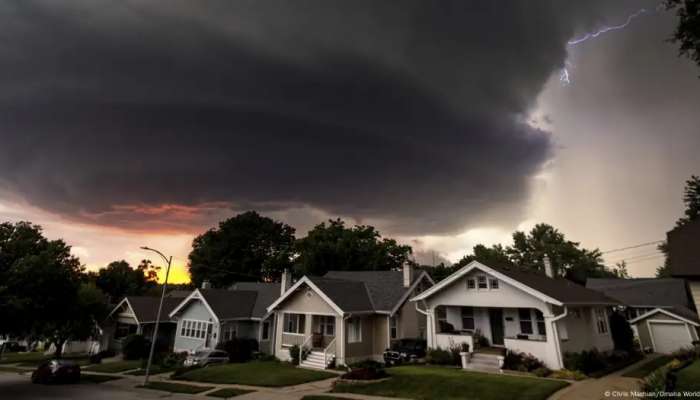
Denmark: One morning, Chris Gloninger opened his emails to find a message from a viewer asking for his home address, saying they wanted to give him a welcome he would remember.
"My heart raced, and I felt paralyzed," said Gloninger, who at the time was presenting the weather on a TV station in Des Moines, in the Midwestern US state of Iowa.
The email referenced the case of a man who had been arrested for attempted murder of Supreme Court Justice Brett Kavanaugh, after showing up at his house with a gun and zip ties.
For Gloninger, it was the final straw after a string of harassment since taking the job as chief meteorologist. He called the police and rushed to a hotel with his wife.
Rise in online hate targeting weather forecasters
As some of the most visible faces of climate change communication, TV weather forecasters have come to face heat from the rise in misinformation and conspiracies fueling online hate.
Viewing climate change as the most important issue of our time, Gloninger had actively championed its prominent inclusion in his TV work.
After taking the Des Moines job, he tailored coverage to the more climate-skeptical leanings of Iowa, a state which been a conservative stronghold since the first election of President Donald Trump in 2016. He tried to link it to everyday experiences such as how drought might impact farmers in the largely agricultural area.
It was then that the emails started arriving in his inbox — at first the usual pushback and then ramping up to more aggressive threats. He noticed viewers were politicising the science.
"They were saying, we're tired of this liberal agenda," said Gloninger. "It should never be about politics, because this is a science that has the support of 99% of its academic community."
A long history of misinformation
Today, climate misinformation and conspiracies are rampant online. This is despite overwhelming scientific consensus that climate change is causing more extreme weather that will only further escalate as global temperatures continue to rise.
The roots of this can be traced back to the middle of the last century. Despite major fossil fuel companies uncovering the link between burning coal, oil and gas and global heating as early as the 1960s, many pursued an active strategy of denial and playing down the science.
But as glaciers have melted, sea levels have risen and dangerous weather has intensified, that denial has become a harder sell. So instead, experts say misinformation has shape-shifted into a form of "delayism" — either by casting doubt on climate solutions or greenwashing companies to give the false impression that they are environmentally friendly.
Research in 2024 showed how fossil fuel and petrochemical companies spent millions on advertising that included misleading claims about their commitment to renewable energy. The sector actually spends just 1% of global investment on clean power and is actively exploring new oil and gas fields.
Complex web of misinformation actors
The networks behind climate misinformation have become very intricate, said Ece Elbeyi, a researcher at the University of Copenhagen in Denmark.
It not only involves those with a vested interest in slowing climate action working with lobbyists and think tanks, but can include media outlets, trolls, Russian bot-farms, and influencers amplifying misinformation on social media platforms, where algorithms favor emotionally charged messaging.
Fertile ground for conspiracy theories
Sometimes misinformation can veer into wild conspiracy theories, which can be particularly attractive to people with high levels of paranoia, insecurity or egocentricity, explained Daniel Jolley, an associate professor in psychology at the University of Nottingham.
Jolley said conspiracies can often make people feel more valued or comforted by painting another powerful group as "evil," adding that they often spike after disasters.
In the wake of deadly flash flooding in Texas this summer, conspiracies surged online accusing scientists and government agencies of causing the disaster by manipulating the weather using cloud seeding.
"People are trying to explain issues that are massive, issues that make us feel uncertain, anxious and perilous," said Jolley.
Jolley expects that because our climate is changing, misinformation and weather conspiracies will become increasingly prominent.
Meteorologists are among the most visible when it comes to communicators of climate science and therefore often come to bear the brunt of attacks, he said.
What can be done to stop misinformation?
Both Jolley and Elbeyi see education as key to identifying misinformation.
Elbeyi said this must involve vulnerable groups in debates because the misinformation tends to thrive when groups feel decisions are made without, or even against, them. "And this exclusion can directly erode public trust in scientists and science more generally."
When it comes to conspiracy theories, building trust and being empathetic to why people may have those beliefs is a better tactic than debunking, said Jolley. He said support is also needed for those, like Gloninger, on the receiving end of abuse.
In the aftermath of the death threat, Gloninger sought therapy and was diagnosed with post-traumatic stress disorder — or PTSD. He couldn't sleep and his health deteriorated, leading to a skin condition.
The police caught the perpetrator and fined him $150 (€129). Meanwhile, back at the TV station, Gloninger continued his work. But after management received a flood of emails from what he calls a loud minority, he was told to stop mentioning climate change.
Gloninger made the choice to leave his job rather than stay and ignore climate change. He said he still finds the decision hard to talk about.
Yet he did feel he made some impact in bringing climate change awareness to a new, conservative audience. He has kept a large folder filled with positive messages from viewers.
He thinks it would be a mistake if climate communicators and weather reporters backed off now because of online hate.
"I do think that there's less coverage of climate change because of the fear of retaliation," said Gloninger "And I encourage meteorologists to double down."